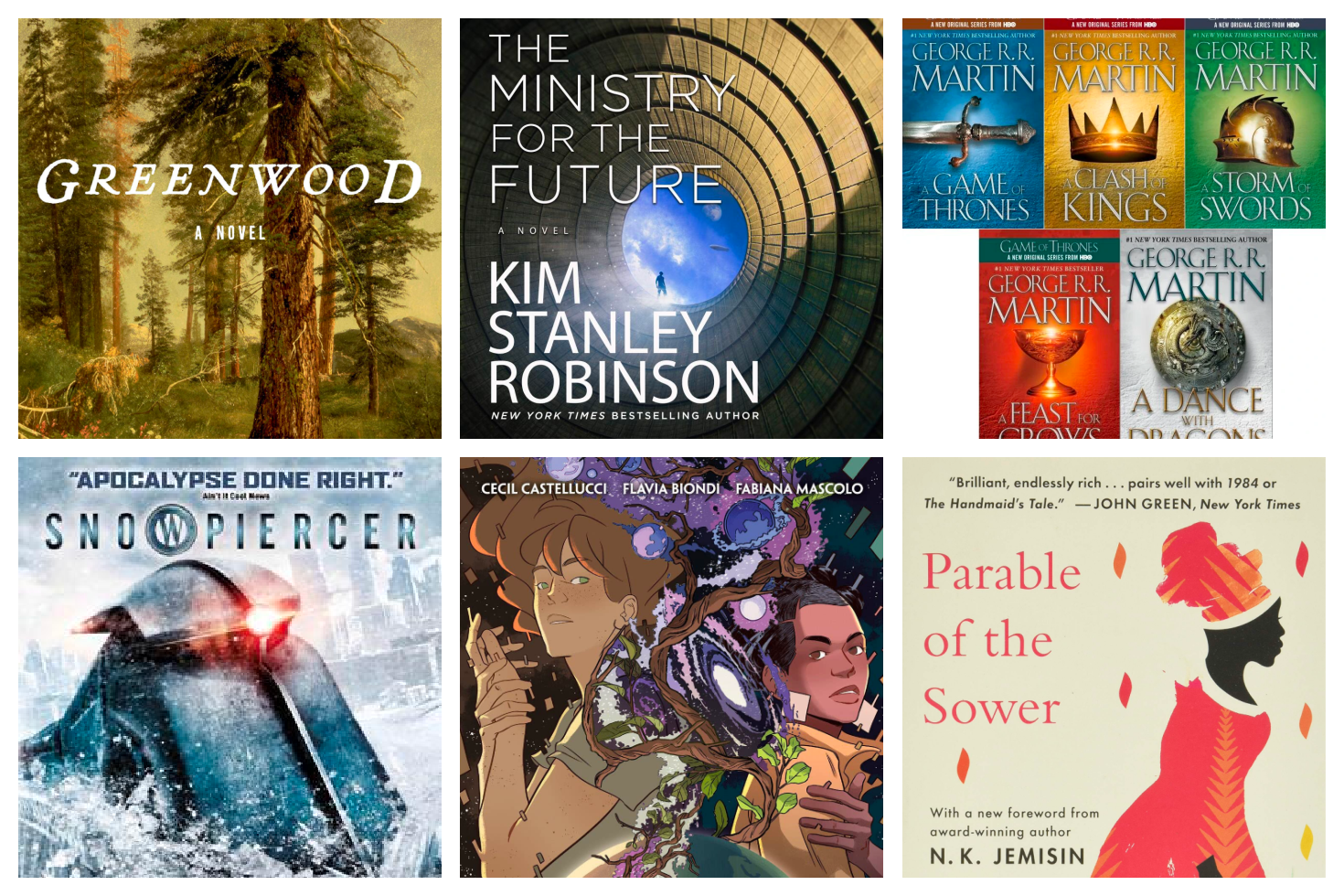Happy Friday! How often do you sit in bed and think, "I wish I had a book to read that focuses on climate tech"? More times than you can count? Well, color me surprised. Me, too! And then, after that first thought, do you search for a climate tech-specific novel and discover that they are few and far between? Me too! This problem is the bane of my existence.
So today, I’ve decided to throw us all a genetically engineered/3-D printed bone and offer a list of books about climate tech, or that are climate tech adjacent. (Cut me a break, it's a super-specific topic.) If you came for climate tech, you’ll like this list. Disclaimer: I have not read all of these books. They have been meticulously cultivated from Goodreads, my library and the GreenBiz Group Slack group. Enjoy!
1. 'The Ministry of the Future' by Kim Stanley Robinson
Just the mention of Kim Stanley Robinson in my company’s Slack group resulted in many excited responses — we’re thrilled that he’s a confirmed speaker for VERGE 22, our climate tech event in October. "The Ministry of the Future" is a novel told exclusively from the perspective of fictional eye-witness accounts about how climate change impacts humanity in the future. Collected by the aptly named Ministry of the Future, first founded in 2025, these perspectives provide a hopeful, desperate and relatable future for the human race. Also, Barack Obama put it on his 2020 favorite books of the year list, so that’s something.
2. 'Greenwood' by Michael Christie
One of my personal favorite books, "Greenwood" explores one family’s multi-generational relationship to a forested island off the coast of British Columbia. Taking place in 2034, 2008, 1974 and 1934, each perspective provides an era-appropriate take on the impending impact of climate change. The generation of the '30s exemplifies the Ford and Rockefeller type tycoons that changed humanity’s interaction with the natural world forever, while the '70s fully commit to flower power aesthetics masking forms of eco-terrorism. Michael Christie’s words engender empathetic reactions from his readers (this reader, for sure), urging one and all to fight for the natural world before humanity’s inevitable self-inflicted damage wipes it away for good.
3. 'Shifting Earth' by Cecil Castellucci, with illustrations by Flavia Biondi and Fabiana Mascolo
Not officially published yet, "Shifting Earth" is a graphic novel focused on two scientists from parallel Earths. The description making the rounds on the interwebs states, "In a not-so-distant future, a freak particle storm has landed botanist Dr. Maeve Millay on an idyllic yet strange parallel Earth, with no way back home. Here, two moons rule society, and nature outshines science. But just like her own climate ravaged planet, this verdant Earth has a sinister side. Children are rare. Humans must serve a purpose or pay an unthinkable price. Astronomer Zuzi battles this underlying darkness every day — just like Maeve did at home. Both women are fighters, and both face a choice: Forge new paths or save the worlds they’ve always known? Maeve will have to decide, and fast — because she’s fighting for more than just herself." CHILLS.
Plus, the artwork from illustrators Flavia Biondi and Fabiana Mascolo looks incredible. Please excuse me; I need a minute to pre-order this winner.
4. 'Snowpiercer' by Jacque Lob, with illustrations by Jean-Marc Rochette
So I’ve seen both the movie and the first few episodes (the era of prestige TV means there are too many shows for me to stick with!) based upon this graphic novel. "Snowpiercer," originally published in French, details the catastrophic fallout of climate change technology gone wrong. After scientists attempt to cool the planet by artificially creating winter conditions, the atmospheric effect becomes permanent, condemning the Earth to a Narnia-esque eternal winter. The last of humanity is confined on a train that never stops. Each section of the train is a commentary on artificial societal standings and the technology preserved for the wealthy at the expense of the poor. "Snowpiercer" the graphic novel looks incredible, and I can’t wait to dig into the material.
5. 'Parable of the Sower' by Octavia E. Butler
Recommended to me by my internet browser and co-workers alike, "Parable of the Sower" eerily presents an alternative reality to our current society. Octavia Butler imagines a ravaged California, post-climate impacts and economic crisis. Natural disasters and societal chaos change the culture of humanity, predicating a dangerous world of kill or be killed. Lauren Olamina is our 15-year-old protagonist, suffering from a dangerous ailment called hyperempathy, or a debilitating sensitivity to others’ emotions. Lauren and her family, surviving in their gated community protecting them from the anarchy outside, must accept the reality of the new world or perish in their old one. This novel explores religion in a time of climate change-caused chaos and reckoning with one’s destiny.
6. 'A Song of Ice and Fire' Series by George R.R. Martin
OK, hear me out! There isn’t much science in the world-renowned "Song of Ice and Fire" series by George R.R. Martin, but you can’t look at me (or realistically, my listicle) with a straight face and deny the real world parallels of Westeros and our society today. Like Westeros, the United States is embroiled in political maneuvering and closed-door decision-making predominantly by self-serving leaders. Meanwhile, beyond the wall, the others (White Walkers) threaten to end the Seven Kingdoms by encasing them in a forever night (Winter is coming!). Sound familiar? White Walkers are certainly the most creative and on-the-nose symbol for climate change I’ve seen in a while. And, unlike the incredible novels that preceded this entry, "Game of Thrones" is an international phenomenon. Regardless of your opinion about the ending of the television series (if your opinion is anything other than it was terrible and the writers failed every single female protagonist, then your opinion is wrong), the impact of "Game of Thrones" as a show, along with the novels that inspired it, is certainly unprecedented and unlikely to happen again.
Mitigating and even reversing the climate crisis will rely upon people from every walk of life and perspective understanding that the threat is larger than their own personal problems and aspirations. This theme of "the lone wolf dies but the pack survives" echoes throughout the pages of the first five novels (and most likely the last three, assuming Martin ever publishes them) and our real-world predicament of nationalism versus globalism.
If Jamie Lannister’s incredible redemption arc (I am convinced Martin won’t throw it away like showrunners David Benioff and David Weiss decided to do) can’t help us find common ground, nothing can.






